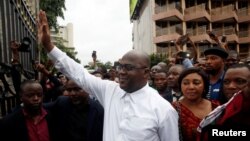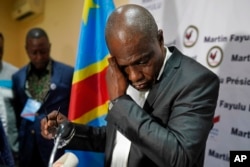Western skepticism is growing over the Democratic Republic of Congo’s announced presidential election results, with France bluntly calling them inconsistent with other findings, and former colonial power Belgium planning to raise the matter at the United Nations Security Council on Friday.
France was quick to react to the surprise win of opposition candidate Felix Tshisekedi in the Democratic Republic of Congo’s presidential election.
Foreign Minister Jean Yves Le Drian told French TV the announcement "did not conform" with other results, notably those produced by Congo’s Catholic church which he described as totally different. Le Drian called for calm and clarity in the true election tally.
Former colonial power Belgium was more nuanced.
Belgian Foreign Minister Didier Reynders told local RTBF broadcaster his country would bring up the matter at the United Nations Security Council. He said given the chaotic election process, he could understand the fears expressed in some quarters.
The DRC’s powerful Catholic church says results tallied by its own election observers do not match the official ones.
The church did not name a winner, but reports say it’s count finds opposition candidate and businessman Martin Fayulu coming out on top.
Fayulu described the official results as an "electoral coup."
The European Union, whose ambassador to the DRC was expelled shortly before the vote, also offered a guarded reaction.
“We have also noted that this results have been contested by a part of the opposition," said spokeswoman Maja Kocijancic. "We are also waiting for the reactions of different observation missions that have observed the elections…and partners, particularly in Africa.”
The latest developments add to a broader snapshot of disarray and questionable practices in the long-overdue vote to succeed President Joseph Kabila.
The Enough Project, a U.S. policy group that focuses on Africa, wants the international community to closely scrutinize the results, and take action if they are found to be rigged.
Sarah Gardiner, who works with the project’s investigative initiative called The Sentry, said: "I think if that process goes forward, there needs to be international support for full transparency and statements to that effect. Not excluding the possibility of increased financial pressures, including sanctions and other financial pressures… if the international community deems and there’s proof that a transparent situation is not happening.”
Over the past week, the United States and other key governments have urged the electoral commission to publish accurate results or face consequences. Washington has also positioned troops in nearby Gabon to protect its assets in Congo and urged U.S. citizens to leave because of security concerns.







